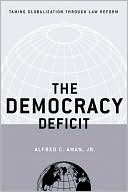The Democracy Deficit: Taming Globalization Through Law Reform
Search in google:
"Contributing significantly to the democracy deficit literature, Aman espouses a re-invigoarated citizenship through domestic law reform, and is, perhaps, surprisingly, sanguine about the future of the 'globalizing state' "—World Trade Review"Anyone who takes the politics of law seriously must read The Democracy Deficit to understand how legal neoliberalism rationalizes economic globalization at the expense of basic democratic values. With analytic rigor and passion, Aman also brilliantly shows how public values, embedded in domestic laws such as administrative law, are an arena and a resource for reshaping globalization."—Christine B. Harrington, New York University "Offers a powerful analysis of the effects of globalization on local governance and a stunningly original strategy for responding to it through domestic law reform. The book's conclusion is critically important: domestic law reforms can shape the meaning of globalization in America and present a blueprint for more accountable globalization elsewhere. The book's powerful analysis and pathbreaking originality set scholarship on a new course and make this one of the best discussions of globalization ever."—Frank W. Munger, past president of the Law and Society Association"Students will appreciate the chance to get away from the cases and read a well-written, thought-provoking text that shows the continued relevance of administrative lawa in today's society." — The Law and Politics Book Review Economic globalization has had a chilling effect on democracy since markets now do some of the work that governments used to do through thepolitical process. More than two decades of deregulation have made a healthy economy appear to depend on unrestrained markets. But appearances are misleading—globalization is also a legal and political process. The future of democracy in the twenty-first century depends on the ability of citizens to reclaim a voice in taming globalization through domestic politics and law reform."The book's topic could not be more important: how do we adapt contemporary democratic governance- and contemporary administrative law- to the challenge of a globalizing world?"—Kal Raustiala, UCLA School of LawCan citizens govern globalization? Aman argues that they can, and that domestic law has a crucial role to play in this process. He proposes to redefine the legal distinction between public and private to correspond to the realities of the new role of the private sector in delivering public services, and thereby to bring crucial sectors of globalization back within the scope of democratic reform. Basing his argument on the history of the policies that led to globalization, and the current policies that sustain it, Aman advocates specific reforms meant to increase private citizens' influence on globalization. He looks at particular problem areas usually thought to be domestic in nature, such as privatization, prisons, prescription drugs, and the minimum wage, as well as constitutional structural issues such as federalism and separation of powers.
Introduction : the domestic face of globalization11Three eras of administrative law and agency regulation152Federalisms old and new : the vertical dimensions of globalization513Privatization and deregulation : the horizontal dimensions of globalization874The implications of the globalizing state for law reform129








